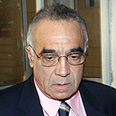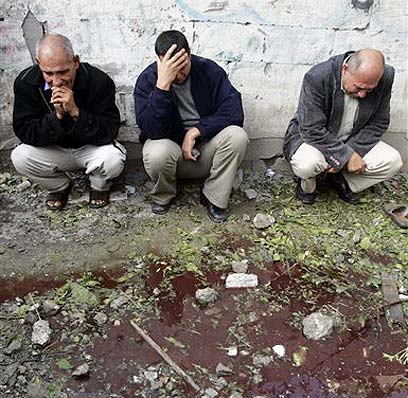

The difficult images broadcast on Wednesday from the accidental shelling of a residential house in Beit Hanoun shocked the world. Viewers were aghast at the scenes of packed morgue refrigerators, bleeding wounded and their distressed families.
Numerous politicians and commentators screamed 'war crime' into any available microphone and virtually nowhere to be found was any mention of Israel's raison d'être for the ongoing Gaza offensive.
So how does one deal with the damage inflicted on Israel's image in what is slowly becoming the most important theater of operations – the media arena? The experts weigh in.
"What happened in Gaza is the village of Qana – take three," says Dr. Ra'anan Gissin, former Prime Minister Ariel Sharon's media adviser and strategist who now works as a foreign media expert.
"The first time in 1996 caught us unprepared," says Dr. Gissin, "and the incident even led to the collapse of the government. The second time was during the second war in Lebanon, and it became apparent that we didn't draw the necessary conclusions from how to deal with such an incident. So what to say now about the third time? I guess we didn't learn the lessons this time either."
According to Gissin, Israel must deal with the Palestinians on two fronts: "The ground one and the virtual front, the media front."
"We have to understand that we have no choice but to win on all the fronts," says Gissin, "because if we don't win our range of our freedom to act will narrow. We must prepare for the media war as we prepare for the ground one – and that includes an operational doctrine, collecting intelligence and the appropriate preparations."

Difficult images broadcast globally (Photo: AP)
"So how is it done? You must broadcast the images of the terror groups hiding their rockets and launching those rockets from those residential areas. The world doesn't see enough of those images. Take one cell, don't destroy it, follow it and then show the world the images of the rockets being fired from within neighborhoods. Because if you kill the cell, and the world never sees it – the world won't believe it ever existed."
Gissin also stresses the importance of understanding how to present the tragedies that befall Israel. He brings up Sharon's well turned-out restraint after the Tel Aviv Dolphinarium discotheque Hamas bombing, in which 21 Israeli youths aged 14-25 were killed and over 100 were wounded.
"The world saw the images of that horror for 48 hours and we were able to get the necessary breathing room to operate - including the ability to go to operation Defensive Shield (triggered by the 2002 Netanya Passover Hamas bombing in which 30 Israelis were killed) with very little international resistance."
Saying the wrong things at the wrong time
Of course the necessary PR array requires investing the necessary resources. Gissin notes that Hizbullah invests 15 percent of its Iranian given 100 million dollars in operating the al-Manar television network. Israel's spokespeople need to be the right people for the job, says Gissin, not just "eloquent English speakers."
Gissin says that IDF officers are often sent to explain Israel's position, but because they are not trained spokesmen they also often "say the wrong things at the wrong time."
But the most important thing he says is to win as many media battles before something like Beit Hanoun happens, because "after that there's not much you can do – their pictures will dominate."
Prime Minister Ehud Olmert was quick to apologize for the deaths of civilians, but Zvi Mazel, Israel's former ambassador to Egypt and Sweden, has a slightly different strategy. Mazel is of the opinion that Israel mustn't apologize for Beit Hanoun.
"The world must be told in the clearest manner that the responsibility lies solely with the terror organizations, which bring it on themselves. Foreign Minister Livni should have convened the foreign press by that afternoon and explained to the journalists that terror groups operate from within the civilian population with the intent to draw the IDF there."

Morgues utilized by Palestinian PR (Photo: AFP)
Mazel says that the world must understand that despite Israel's withdrawal from Gaza the Palestinians continue to relentlessly launch Qassam rockets at Israeli towns with the intent to kill.
"The world must understand that the lives of Israeli citizens have become hell – they can't work, they can't live, not to mention the economic damage. If Livni and her friends were saying that, then our situation would be completely different."
Mazel also disapproves if Israel's terminology. He says that Qassams should be called 'missiles', meant to kill civilians.
"Terror groups are committing crimes," he says, "and I believe that the foreign press won't be able to ignore that reality if it is presented in the clearest possible manner. We have nothing to apologize for – we are operating against an enemy which calls for our annihilation and that enemy forces us to fight in populated areas."
"I think that someone has lost it in this country – it's becoming obvious that the Israeli government doesn't know how to defend the state of Israel on the political and explanatory front."















